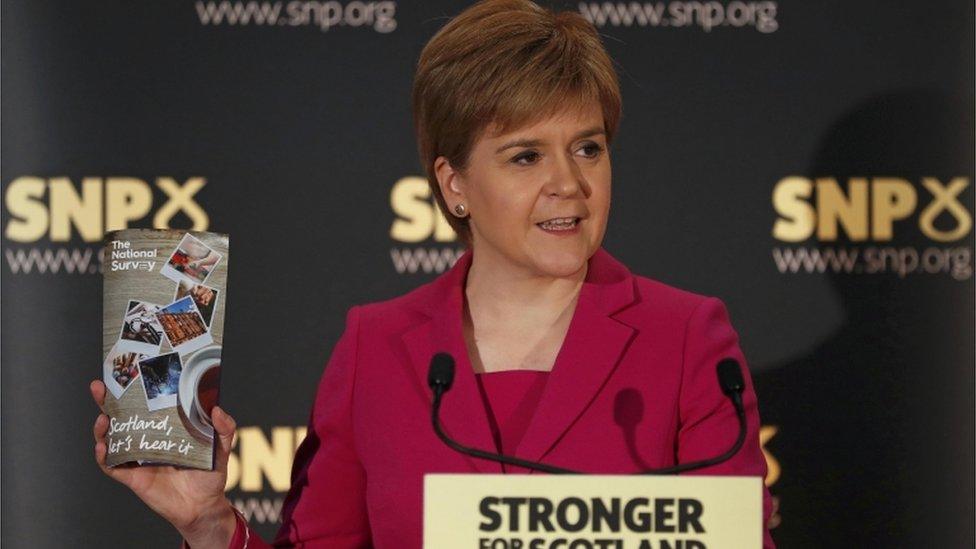Independence 'listening exercise' to end
- Published

Ms Sturgeon launched the national survey at an event in Stirling in September
The SNP's "listening exercise" on Scottish independence, which was announced by Nicola Sturgeon in September, is due to end.
Ms Sturgeon had said she hoped the "national survey" would involve two million people across the country.
It had been due to run until St Andrew's Day - 30 November.
Ms Sturgeon told BBC Scotland on Tuesday that the latest assessment suggested 1.7 million people had taken part.
The SNP leader and Scottish first minister added that "this was never an opinion poll, it is not a scientific for or against independence.
"What it was was an SNP exercise to engage with the Scottish people on some of the issues around independence, and obviously we will take the time to analyse the responses we've had."
When asked what the results showed, Ms Sturgeon said: "I will tell you once it has concluded tomorrow."
When she launched the initiative at an event in Stirling, Ms Sturgeon - the SNP leader and Scottish first minister - said she wanted to hear in detail how people felt about Europe, Brexit and independence.
Members of the public were invited to take part through a dedicated website, and the party's MPs and MSPs were also told to hold town hall meetings.
The SNP's 120,000 members were encouraged to "hit the doorsteps" to ask people to take part, and were sent a pack of "survey cards" which they would ask five people a month to fill in.
'Rethinking their position'
Data gathered during the exercise could be used by the SNP if Ms Sturgeon decides to call another referendum on leaving the UK.
Speaking to the BBC's Sunday Politics Scotland programme at the weekend, the Scottish government's culture secretary, Fiona Hyslop, said she did not know whether the results of the survey would be published.
She said there had been a "lot of interest" from people who voted No in the independence referendum two years ago but were "rethinking their position" after voting Remain in the EU referendum.
When asked whether the results of the survey would be published, Ms Hyslop replied: "I don't know because I'm not part of the party operation doing that."
She also said: "It is a listening exercise, it is a party exercise. I'm not running the consultation process", and that she was "expecting to have the results of what has come forth in some shape or form".

Ms Sturgeon has continued to raise the prospect of second independence referendum as she seeks to protect Scotland's place in Europe
Ms Sturgeon told the upper house of the Irish Parliament on Tuesday that another vote on independence remained "firmly on the table" if it was felt to be the best way of protecting Scotland's interests in the wake of the Brexit vote.
However, a YouGov poll for the Times newspaper, external that was published on Wednesday morning put support for independence at 44%, with 56% backing the Union.
Polling expert Prof John Curtice said it was the first time a poll had suggested support for independence had slipped from the 45% who voted Yes in the referendum in 2014.
The poll also suggested only 31% of people want the Scottish government to campaign for independence in the next two years, while 56% do not.
And respondents were asked about whether they think it would be "realistically possible" for Scotland to remain part of the EU after the rest of the UK leaves, regardless of their support for such a move.
'Pay heed'
Only 22% said they thought this would be "probably possible", with 62% saying "probably not possible" and 16% said they did not know.
And 13% said they had been contacted by the SNP as part of the national conversation survey while 82% said they had not.
YouGov polled 1,134 people from November 24-29.
It is the latest in a series of polls which have suggested the Brexit vote has not yet led to a surge in support for independence.
A spokesman for the Scottish Conservatives said it was time for the SNP to "finally pay heed to what Scotland is saying - 'no' to a second referendum and 'no' to more division, more uncertainty and more rancour".
But an SNP spokesman pointed out that the poll suggested the SNP still has a commanding lead over the opposition in Holyrood voting intention, with the party on 48% in the constituency vote and 39% in the regional vote.
He added: "That is a very strong endorsement of the party's record in office and of Nicola Sturgeon as first minister."